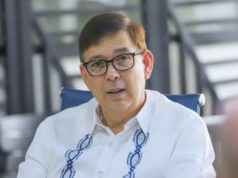FINANCE SECRETARY Carlos G. Dominguez III said the government’s various cash aid initiatives can follow the lead of the Small Business Wage Subsidy (SBWS) program in adopting electronic fund transfers, which he said reduces opportunities for corruption.
At a recorded meeting aired Tuesday, Mr. Dominguez said the (SBWS) was implemented in April-June and resulted in the transfer of P46 billion in cash aid via the Social Security System (SSS) to help small firms retain more than 3.1 million workers.
He said future subsidy programs should be digitized starting at the application level, with funds handed out via banks or electronic wallets (e-wallets). He added that implementing agencies should partner with private entities if possible.
“We think all subsidy programs in the future should be digitized. In other words, go through digitalization of all transactions. And number two, the direct distribution of aid should be through banks or e-wallet accounts of the intended beneficiaries,” he said.
“And one of the most important factors that made this a relatively successful program, is close administration oversight of the critical steps of the program,” he added.
President Rodrigo R. Duterte said at the same meeting he is in favor of digitizing subsidy programs to reduce corruption as it eliminates human intervention.
SBWS was jointly implemented by the Department of Finance, the SSS and the Bureau of Internal Revenue (BIR).
The government also tapped banks and private entities to help with the release of cash, including mobile wallet PayMaya, Union Bank of the Philippines, Inc. (UBP) and remittance center M Lhuillier Financial Services.
“So you have a problem, bring in the private sector to help you and you can solve it very quickly. But (it is important) that every day you’re on top of the situation. Do not let any problem grow big. Kasi pag malaki na, mahirap ng i-correct (because if the issue grows, it is harder to resolve),” Mr. Dominguez said.
The subsidy program used the database of the BIR and the SSS to verify the eligibility of employers and the authenticity of beneficiaries. Upon verification, the names and details of the recipient workers were sent electronically to the Development Bank of the Philippines, which facilitated the payouts through PESONet to banks and other channels.
The government was able to approve the applications of 113,449 employers for the program. — Beatrice M. Laforga



